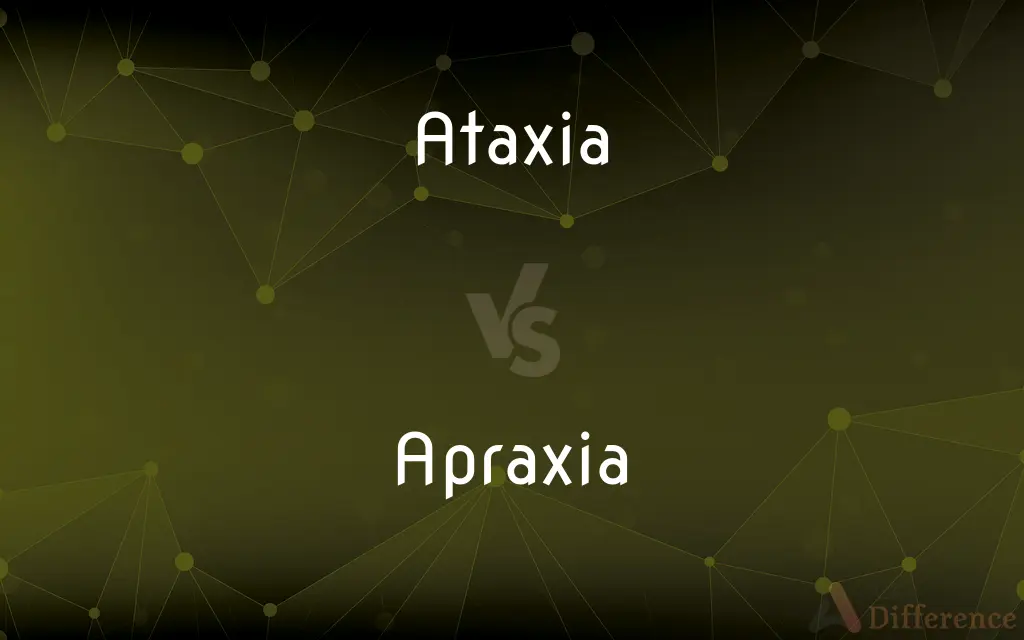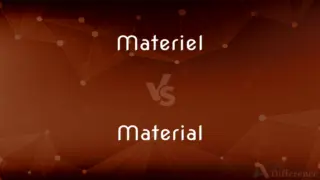Ataxia vs. Apraxia — What's the Difference?
By Tayyaba Rehman — Updated on September 18, 2023
Ataxia refers to a lack of muscle coordination during voluntary movements, often due to nerve damage or degeneration. Apraxia is the inability to execute learned movements, despite having the desire and physical capability, usually due to brain damage.

Difference Between Ataxia and Apraxia
Table of Contents
ADVERTISEMENT
Key Differences
Ataxia is a medical term that describes a condition involving a lack of coordination in muscle movements. The problem with ataxia is that it interferes with a person's ability to walk, pick up objects, or perform other voluntary actions. Apraxia, on the other hand, is a neurological condition that affects a person's ability to perform learned movements, such as using tools, even when they want to and have the physical ability to do so.
It's important to note that while ataxia is often the result of damage to the cerebellum or peripheral nerves, apraxia is typically caused by damage to the cerebral cortex. Ataxia might manifest as shaky movements or an unstable gait, but apraxia manifests as an inability to perform complex movements like dressing oneself, despite understanding the task and having the intention to do it.
The root word for ataxia is "taxia," which relates to order or arrangement, suggesting a disorder of coordination. The root for apraxia is "praxis," relating to action, indicating a disorder of action or execution. While both conditions affect movement, ataxia pertains to the lack of effective coordination, and apraxia pertains to the inability to execute learned skills.
Both ataxia and apraxia are diagnosed through a series of clinical evaluations and tests. Ataxia evaluations may include MRI scans and nerve conduction studies, while apraxia assessments often involve neuropsychological tests and sometimes brain imaging. Even though both conditions may appear similar, they have different underlying causes and may require different treatment plans.
Compare with Definitions
Ataxia
Disruption of muscle control usually due to nerve damage.
His ataxia was caused by peripheral nerve damage.
ADVERTISEMENT
Apraxia
Neurological condition affecting execution of learned movements.
Apraxia made it difficult for her to use utensils.
Ataxia
Loss of coordination in voluntary muscle movements.
The patient's ataxia made it difficult for him to walk.
Apraxia
Disorder impacting purposeful motor skills.
Apraxia affected his ability to write neatly.
Ataxia
Degenerative condition affecting coordination.
Ataxia worsened over time, affecting his quality of life.
Apraxia
Loss of skilled voluntary movements.
She had the will but apraxia prevented her from playing the piano.
Ataxia
Inability to regulate voluntary muscle activities.
Due to ataxia, she struggled with tasks like picking up objects.
Apraxia
Inability to perform complex tasks despite understanding them.
He could explain how to tie a knot but couldn't do it due to apraxia.
Ataxia
Ataxia is a neurological sign consisting of lack of voluntary coordination of muscle movements that can include gait abnormality, speech changes, and abnormalities in eye movements. Ataxia is a clinical manifestation indicating dysfunction of the parts of the nervous system that coordinate movement, such as the cerebellum.
Apraxia
Disruption in brain's ability to plan motor functions.
Apraxia was diagnosed after he failed neuropsychological tests.
Ataxia
The loss of full control of bodily movements.
Apraxia
Apraxia is a motor disorder caused by damage to the brain (specifically the posterior parietal cortex or corpus callosum) which causes difficulty with motor planning to perform tasks or movements. The nature of the damage determines the disorder's severity, and the absence of sensory loss or paralysis helps to explain the level of difficulty.
Ataxia
Loss of the ability to coordinate muscular movement.
Apraxia
Inability to perform particular purposive actions, as a result of brain damage
Dressing apraxia
Ataxia
Any of various degenerative, often hereditary, disorders that are characterized by ataxia and are frequently associated with cerebellar atrophy.
Apraxia
Total or partial loss of the ability to perform coordinated movements or manipulate objects in the absence of motor or sensory impairment.
Ataxia
(pathology) Lack of coordination while performing voluntary movements, which may appear to be clumsiness, inaccuracy, or instability.
Apraxia
(neurology) Total or partial loss of the ability to perform coordinated movements or manipulate objects in the absence of motor or sensory impairment; specifically, a disorder of motor planning.
Ataxia
(chemistry) The condition of a polymer in which the orientation of the subunits is random
Apraxia
Inability to make purposeful movements, but without paralysis or loss of sensory function.
Ataxia
(obsolete) Disorder; irregularity.
Apraxia
Inability to make purposeful movements
Ataxia
Disorder; irregularity.
Ataxia
Irregularity in disease, or in the functions.
Ataxia
Loss of coordination in the voluntary muscles, especially the limbs; an inability to coordinate voluntary muscle movements; it results in unsteady movements and a staggering gait. See also locomotor ataxia, an ataxia which occurs when attempting to perform coordinated muscular movements.
Ataxia
Inability to coordinate voluntary muscle movements; unsteady movements and staggering gait
Ataxia
Neurological disorder affecting balance and coordination.
Ataxia can lead to frequent falls.
Common Curiosities
What is Apraxia?
Apraxia is the inability to execute learned movements despite understanding and capability.
Are Ataxia and Apraxia the same?
No, ataxia affects coordination, while apraxia affects the execution of learned movements.
What is Ataxia?
Ataxia is a loss of coordination in voluntary muscle movements.
What causes Apraxia?
Usually brain damage affecting the cerebral cortex.
How is Ataxia diagnosed?
Through MRI scans and nerve conduction studies.
What causes Ataxia?
Often nerve damage, degenerative conditions, or issues with the cerebellum.
Can Apraxia be cured?
Treatment focuses on relearning lost skills; again, a cure depends on the cause.
How is Apraxia diagnosed?
Through neuropsychological tests and sometimes brain imaging.
Can Ataxia be cured?
Treatment focuses on improving coordination; a cure depends on the underlying cause.
Can children have Ataxia or Apraxia?
Yes, both conditions can affect children, often with different underlying causes.
Is Ataxia progressive?
It can be, especially if caused by a degenerative condition.
Is Ataxia a motor neuron disease?
No, it's generally considered a coordination disorder.
Do both Ataxia and Apraxia affect speech?
Yes, both can affect speech, but in different ways.
Is Apraxia progressive?
Not usually, but it can worsen without intervention.
Is Apraxia a form of dementia?
No, but it can occur alongside certain types of dementia.
Share Your Discovery

Previous Comparison
Materiel vs. Material
Next Comparison
Homeless vs. BumAuthor Spotlight
Written by
Tayyaba RehmanTayyaba Rehman is a distinguished writer, currently serving as a primary contributor to askdifference.com. As a researcher in semantics and etymology, Tayyaba's passion for the complexity of languages and their distinctions has found a perfect home on the platform. Tayyaba delves into the intricacies of language, distinguishing between commonly confused words and phrases, thereby providing clarity for readers worldwide.
















































